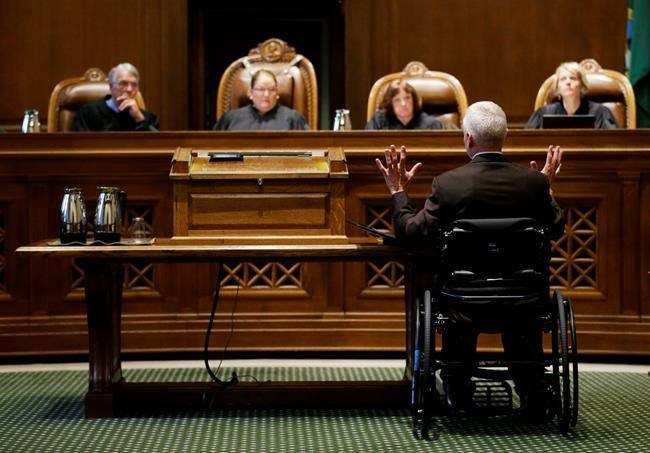
FILE - In this Oct. 24, 2017 file photo, Tom Ahearne, lower right, the lead attorney in a lawsuit against the state of Washington regarding the funding of education, speaks during a Washington Supreme Court hearing in Olympia, Wash. The Washington Supreme Court says lawmakers have successfully finalized a long-running case on state funding of basic education. (AP Photo/Ted S. Warren, File)
June 07, 2018 - 4:49 PM
OLYMPIA, Wash. - A long-running court case over the adequacy of education funding in Washington state has ended, with the state Supreme Court on Thursday lifting its jurisdiction over the case and dropping daily sanctions after the Legislature funneled billions more dollars into public schools.
The court's unanimous order came in response to lawmakers passing a supplemental budget earlier this year that the justices said was the final step needed to reach compliance with a 2012 state Supreme Court ruling that found that K-12 school funding was inadequate. Washington's Constitution states that it is the Legislature's "paramount duty" to fully fund the education system. The resolution of the landmark case in Washington state comes as other states like Arizona, Oklahoma and Kentucky are now responding to calls for more money to be allocated to education.
The state had been in contempt of court since 2014 for lack of progress on that ruling, and daily sanctions of $100,000 — allocated specifically for education spending— had been accruing since August 2015.
"Reversing decades of underfunding has been among the heaviest lifts we've faced in recent years and required difficult and complex decisions, but I'm incredibly proud and grateful for all those who came together on a bipartisan basis to get this job done," Washington Gov. Jay Inslee said in a written statement.
Over the past few years, lawmakers had put significantly more money toward education costs like student transportation and classroom supplies, but the biggest piece they needed to tackle to reach full compliance was figuring out how much the state must provide for teacher salaries. School districts had paid a big chunk of those salaries with local property-tax levies, something the court said had to be remedied.
In November, the court said a plan passed by the Legislature last year — which included a statewide property tax increase earmarked for education — satisfied its earlier ruling, but justices took issue with the fact that the teacher salary component of the plan wasn't fully funded until September 2019. This year, lawmakers expedited that timeframe to Sept. 1, 2018.
Democratic House Majority Leader Pat Sullivan said that the court's order was a relief, though he noted that legislative debates over education funding aren't over. Sullivan said there is more work to be done on areas like special education, as well as recruiting and retaining teachers.
"But now we can focus on policy geared toward kids rather than compliance with a court," he said.
In a written statement, Summer Stinson, president of the education-advocacy group Washington's Paramount Duty, criticized the decision, writing "any parent can walk into a classroom in Washington State and immediately see that our schools are not receiving the full and ample funding promised to our students in the state constitution."
"The legislature has failed our students and the Court has washed its hands of the matter," she wrote. "But we will not rest until every child in our state gets a fully and amply funded public education."
Tom Ahearne, the attorney for the coalition of school districts, teachers, parents and community groups that sued the state, said Thursday that there is still a judicial question of whether the state's current funding formulas are constitutional, and he notes that the court's order doesn't specifically weigh in on that. Because of that, he said that school districts could feasibly sue over specific issues, like whether special education is being amply funded.
But he said the case has still accomplished a great deal, by not only setting legal ground rules for what "paramount duty" means when it comes to education funding, but also ensuring that the state increased its K-12 funding by "billions and billions" of dollars.
"Before, there was a lot of lip service but not a lot of focus," Ahearne said. "People are now focused on funding public schools as being an important component of state government."
News from © The Associated Press, 2018